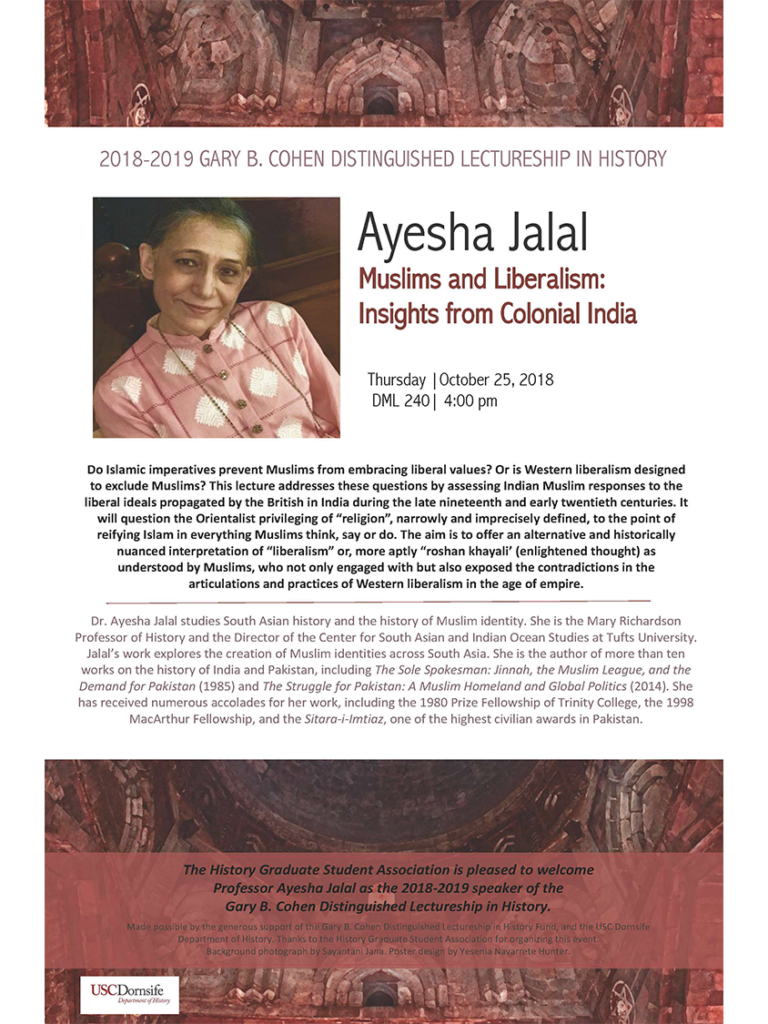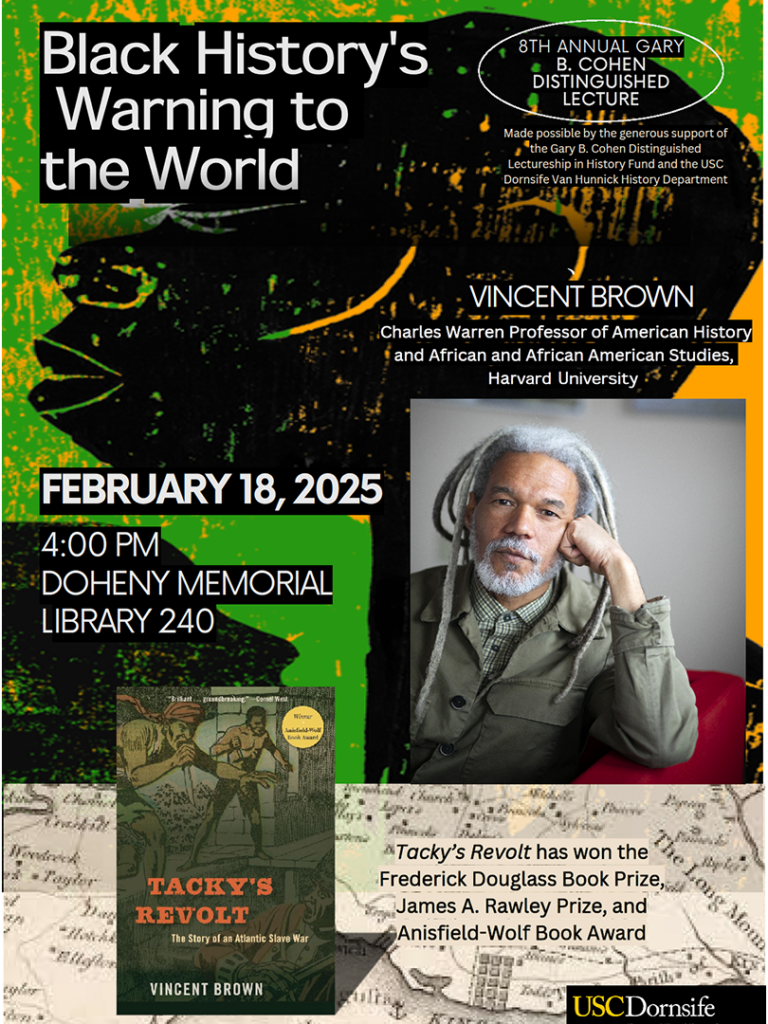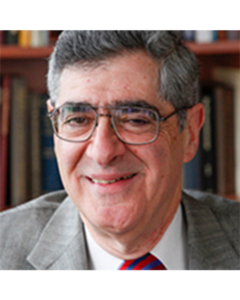
About
The Gary B. Cohen Distinguished Lectureship in History Fund was generously established in 2018 and continues to be a yearly highlight for our graduate program. This event is organized completely by the History Graduate Student Association.
Gary B. Cohen was educated at the University of Southern California (B.A., 1970) and Princeton University (M.A., 1972; Ph.D., 1975). He was a member of the University of Oklahoma history faculty from 1976 to 2001, where he taught a range of courses on modern European social and political history and East-Central Europe in the nineteenth and twentieth centuries. In August 2001, after twenty-five years of service at the University of Oklahoma, he joined the University of Minnesota, Twin Cities, as director of the Center for Austrian Studies, executive editor of The Austrian History Yearbook, and professor of history. In summer 2010, he completed his service at the Center for Austrian Studies and began a three-year term as chair of the Department of History, University of Minnesota, Twin Cities. In 2014-2015 he served as interim director of the Center for Austrian Studies, and in January 2017 he retired from the University of Minnesota faculty.
Professor Cohen’s research has focused on social development, ethnic group relations, and education in modern Austria and the Czech lands. His publications include two monographs, The Politics of Ethnic Survival: Germans in Prague, 1861-1914 (Princeton University Press, 1981; second edition, revised, Purdue University Press, 2006) and Education and Middle-Class Society in Imperial Austria, 1848-1918 (Purdue University Press, 1996); five co-edited volumes of essays; articles in The Journal of Modern History, Central European History, The Austrian History Yearbook, Český časopis historický, The East European Quarterly, Jewish History, and The Social Science Quarterly; and numerous book chapters. In 2000, Karolinum – The Charles University Press published a Czech translation of his study on the German minority of Prague under the title, Němci v Praze, 1861-1914; in early 2006, Purdue University Press published in paperback a revised second edition in English. In late 2022, Academia, the press of the Academy of Sciences of the Czech Republic, published a Czech translation of his book on education and society in late imperial Austria under the title, Vzdělání a střední třída v císařském Rakousku 1848–1918.
Professor Cohen’s scholarship has earned national and international recognition. Grants from the American Philosophical Society, the American Council of Learned Societies, the International Research and Exchanges Board (IREX), the United States Department of Education, and the National Endowment for the Humanities have supported his research. He served on the national selection committee for East European exchange fellowships of the International Research and Exchanges Board in 1984-86, and during the late 1980s was the only participant from the United States in the European Science Foundation’s project on “Governments and Non-Dominant Ethnic Groups in Europe, 1850-1940.” Prof. Cohen served as the executive secretary of the Society for Austrian and Habsburg History in 2000 and 2001 and as president of the Conference Group for Central European History of the American Historical Association in 2010. The Collegium Carolinum in Munich elected him a full member in 2003, and the Republic of Austria awarded him its Ehrenkreuz (cross of honor) for Science and Arts, first class, in November 2009. On April 15, 2011, members of the Austrian Academy of Sciences elected Prof. Cohen a Corresponding Member of the Academy’s humanities and social science section. On May 22, 2018, the Academy of Sciences of the Czech Republic awarded him the František Palacký Honorary Medal for Merit in Historical Sciences.
All Events
“Black History’s Warning to the World”
The USC Dornsife Van Hunnick History Department, through the generous support of the Gary B. Cohen Distinguished Lectureship in History fund, presents the Eighth Annual Gary B. Cohen Distinguished Lecture with Harvard Professor Vincent Brown.
Brown is the Charles Warren Professor of American History and Professor of African and African American Studies at Harvard University. He teaches courses in Atlantic history, African diaspora studies, and the history of slavery in the Americas. Brown is the author of The Reaper’s Garden: Death and Power in the World of Atlantic Slavery (Harvard University Press, 2008) and Tacky’s Revolt: The Story of an Atlantic Slave War (Belknap Press, 2020), and he is producer of Herskovits at the Heart of Blackness (2009), an audiovisual documentary broadcast on the PBS series Independent Lens, and the short video series The Bigger Picture (2022) for PBS Digital Studios.
His book, Tacky’s Revolt: The Story of an Atlantic Slave War, has won the Fredrick Douglass Book Prize, James A. Rawley Prize, and the Anisfield-Wolf Book Award.
This esteemed event is made possible by the generous support of the Gary B. Cohen Distinguished Lectureship in History Fund and the USC Dornsife Van Hunnick History Department.
To view this lecture, please click here.
2024 | Mae M. Ngai
“The Chinese Question: The Gold Rushes and Global Politics”
The USC Dornsife Van Hunnick History Department, through the generous support of the Gary B. Cohen Distinguished Lectureship in History fund, presents the Seventh Annual Gary B. Cohen Distinguished Lecture with Columbia Professor Mae M. Ngai, Lung Family Professor of Asian American Studies, Professor of History, and 2022 Bancroft Prize Award Winner for The Chinese Question: The Gold Rushes and Global Politics (2021).
Mae M. Ngai is Lung Family Professor of Asian American Studies and Professor of History, and Co-Director of the Center for the Study of Ethnicity and Race. She is a U.S. legal and political historian interested in the histories of immigration, citizenship, nationalism, and the Chinese diaspora. She is author of the award winning Impossible Subjects: Illegal Aliens and the Making of Modern America (2004); The Lucky Ones: One Family and the Extraordinary Invention of Chinese America (2010); and The Chinese Question: The Gold Rushes and Global Politics (2021). Ngai has written on immigration history and policy for the Washington Post, New York Times, Los Angeles Times, the Atlantic, the Nation, and Dissent. Before becoming a historian she was a labor-union organizer and educator in New York City, working for District 65-UAW and the Consortium for Worker Education.
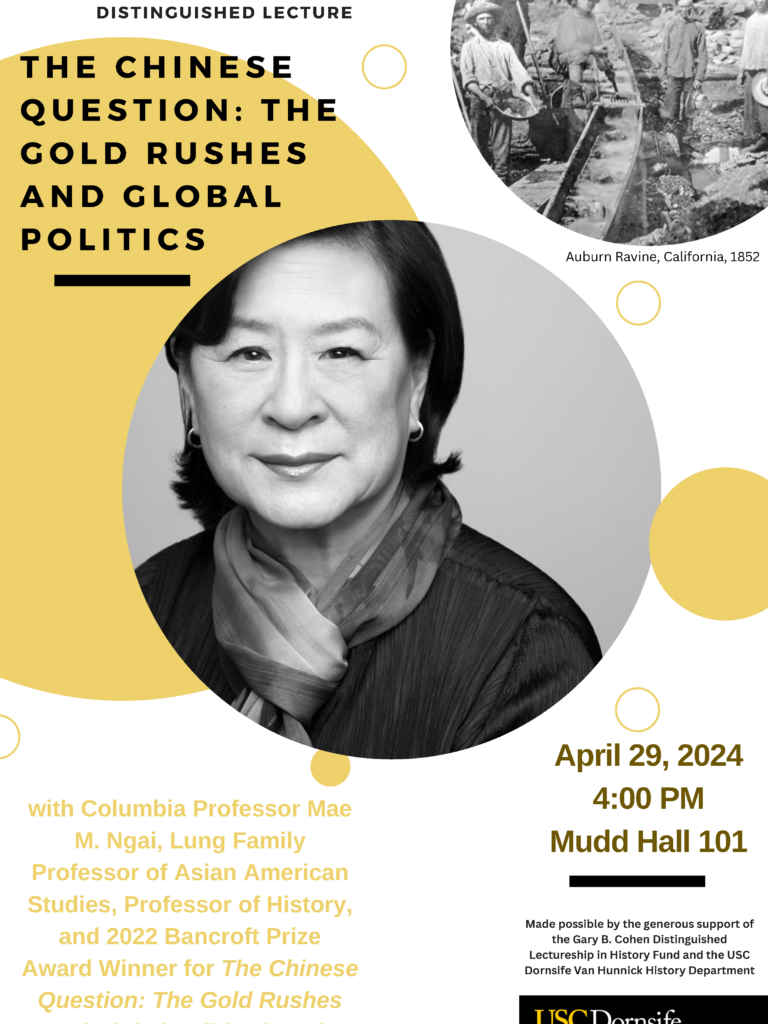
2023 | Provost Ben Vinson III
“A Journey Through Afro-Mexico: Reflections on a Career in Studying Blackness in Mexico”
The USC Dornsife Van Hunnick History Department, through the generous support of the Gary B. Cohen Distinguished Lectureship in History fund, presents the Sixth Annual Gary B. Cohen Distinguished Lecture with Provost Ben Vinson III, Hiram C. Haydn Professor of History at Case Western Reserve University.
Ben Vinson III was appointed Provost and Executive Vice President at Case Western Reserve University on July 2, 2018, and is responsible for all facets of the academic programs and research of the university.
During his time at CWRU, Dr. Vinson has spearheaded the university’s Think Big strategic planning initiative—which has received national attention for its innovative and inclusive planning process. He has also worked to increase collaboration and entrepreneurship on campus by naming an associate provost to the post of interprofessional education, research and collaborative practice; and by appointing a founding director for the Veale Institute for Entrepreneurship. He is Co-PI of the Humanities in Leadership Learning Series (HILLS) program, funded by a $2 million grant from the Mellon Foundation to promote leadership development and diversity in the humanities.
Vinson is an accomplished historian of Latin America, and the recipient of the 2019 Howard F. Cline Book Prize in Mexican History for his book, “Before Mestizaje: The Frontiers of Race and Caste in Colonial Mexico.”
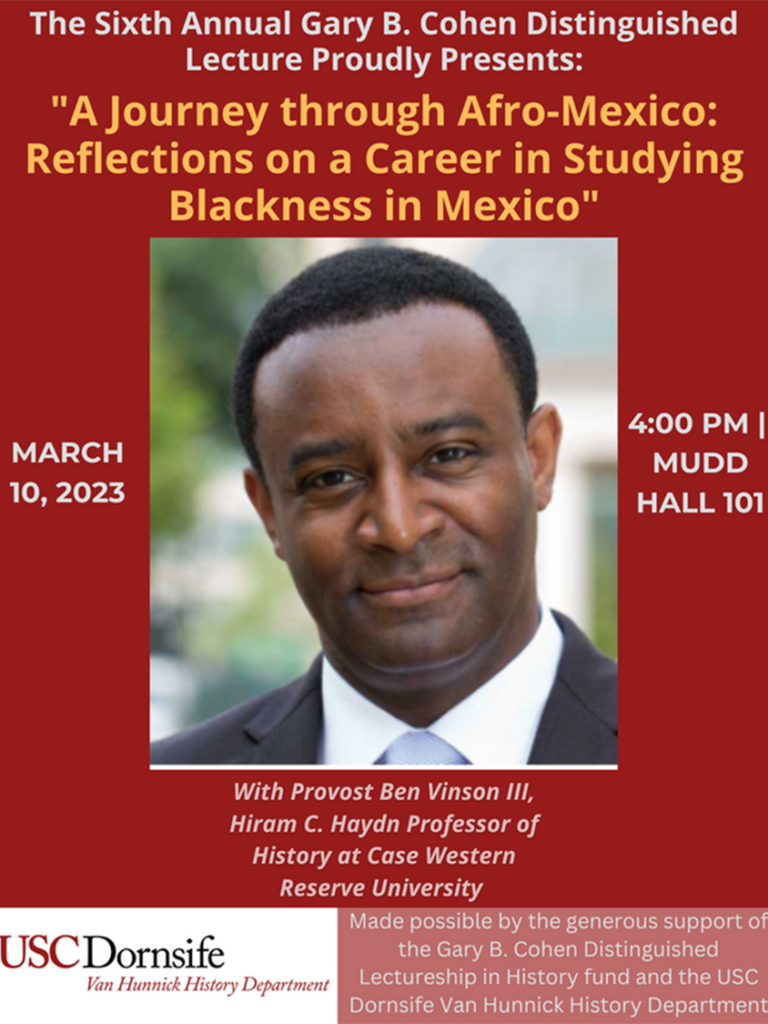
2022 | Dr. Elizabeth Hinton
“The Fire this Time: Police Violence and Urban Uprisings from the 1960s to Breonna Taylor”
Dr. Elizabeth Hinton is an Associate Professor in the Department of History at the Department of African American Studies at Yale, with a secondary appointment as Professor of Law at the Law School. Dr. Hinton’s research focuses on the persistence of poverty, racial inequality, and urban violence in the 20th century United States. She is considered one of the nation’s leading experts on criminalizing and policing.
This event is made possible by the generous support of the Gary B. Cohen Distinguished Lectureship in History Fund and the USC Department of History.
Poster created by Sayantani Jana.
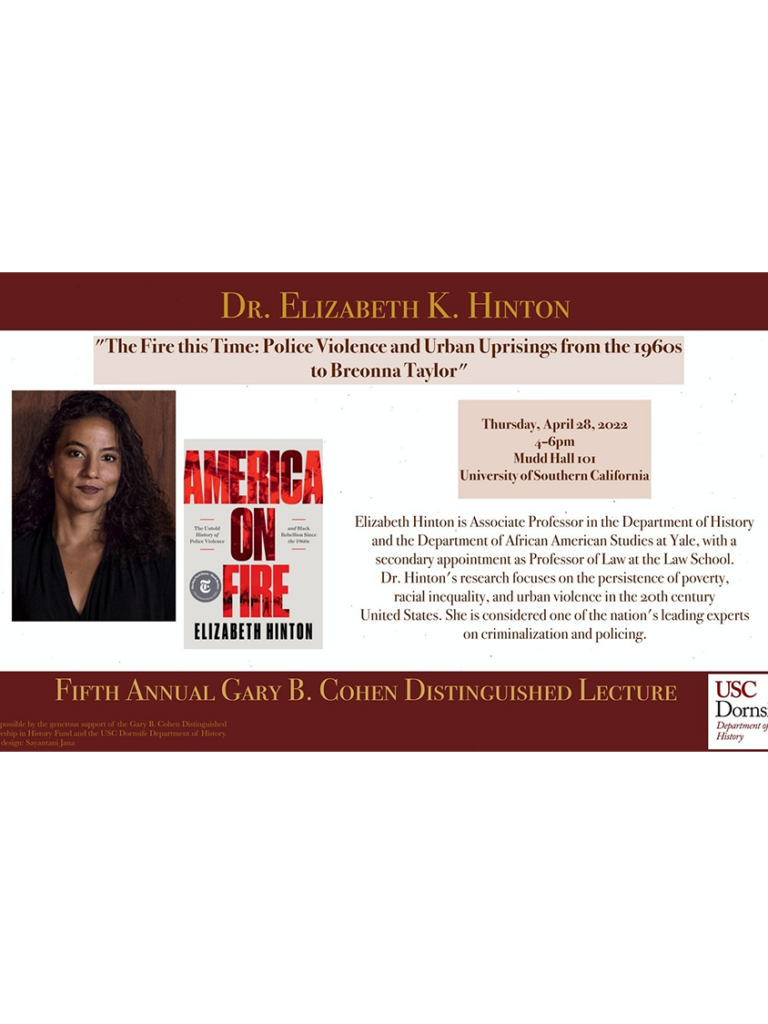
2021 | Dagmar Herzog
“Moral Reasoning in the Wake of Mass Murder: Disability and Reproductive Rights in 1980s-1990s Germany”
The 2021 Gary B. Cohen Distinguished Lectureship in History with Dagmar Herzog, distinguished professor of History at the Graduate Center, City University of New York.
Herzog explores how reproductive rights and disability rights, both latecomers to the postwar human rights canon, came to be seen as competing – with unexpected consequences. Homing in on a controversy erupting over philosopher Peter Singer’s right to speak in Germany in summer 1989 – amid conservative backlash against the partial liberalization of abortion access achieved by feminists in the 1970s, but intersecting with a long-delayed reconsideration of the Nazi disability murder project that had claimed nearly 300,000 lives between 1939 and 1945 – Herzog analyzes the effects of historical ricochet.
Dagmar Herzog is Professor of History and Daniel Rose Faculty Scholar at the Graduate Center, City University of New York. Among her books are Sex after Fascism (Princeton, 2005), Sexuality in Europe (Cambridge, 2011), Cold War Freud (Cambridge, 2017) and Unlearning Eugenics (Wisconsin, 2018). The Routledge Companion to Sexuality and Colonialism, coedited with Chelsea Schields, is forthcoming 2021. She is currently writing on the theology of disability in Germany, 1900-2020.
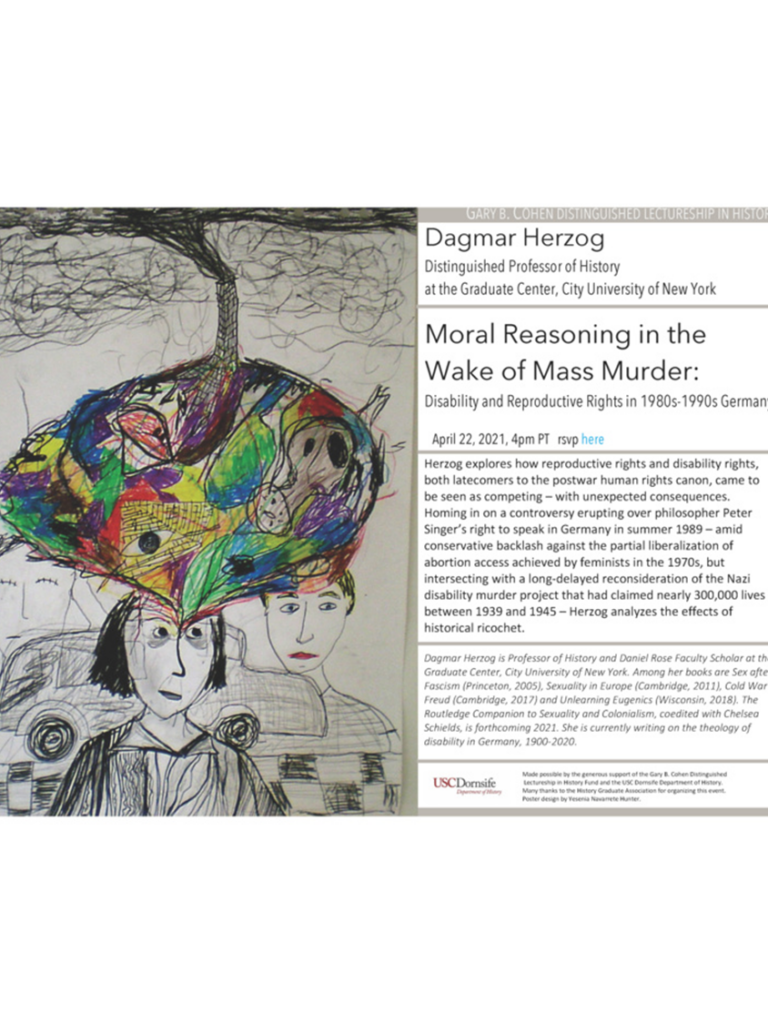
2020 | David W. Blight
“Composite Nation: Frederick Douglass and the Hope of Democracy in These Authoritarian Times”
In 1869 Douglass delivered a speech, “Composite Nation,” in which he imagined a new America forged in the Civil War and emancipation, as well as the three Reconstruction Constitutional Amendments. That new America in that heady moment, he hoped, would become a true multi-racial, multi-religious, multi-ethnic country, living under the rule of law and equality before the law. How are we doing with that vision now? What kind of rebirth might we imagine for that vision?
David W. Blight is the Sterling Professor of History, of African American Studies and American Studies at Yale University. His book, Frederick Douglass: Prophet of Freedom, won the 2019 Pulitzer Prize in History.
Made possible by the generous support of the Gary B. Cohen Distinguished Lectureship in History Fund and the USC Dornsife Department of History. Many thanks to the History Graduate Student Association for organizing this event.
Artwork, “Fingerprints and Landscape,” created in and with community at the PCB-AHA 2017, and poster design by Yesenia Navarrete Hunter.
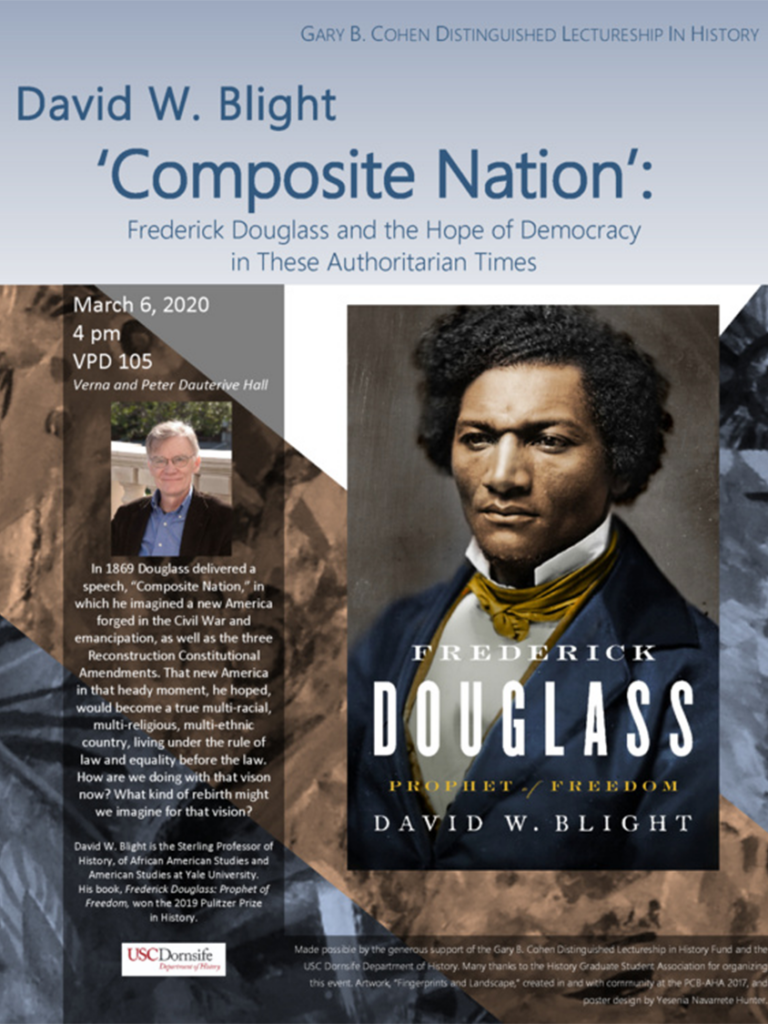
2018-2019 | Ayesha Jalal
“Muslims and Liberalism: Insights from Colonial India”
Do Islamic imperatives prevent Muslims from embracing liberal values? Or is Western liberalism designed to exclude Muslims? This lecture addresses these questions by assessing Indian Muslim responses to the liberal ideals propagated by the British in India during the late nineteenth and early twentieth centuries. It will question the Orientalist privileging of “religion”, narrowly and imprecisely defined, to the point of reifying Islam in everything Muslims think, say or do. The aim is to offer an alternative and historically nuanced interpretation of “liberalism” or, more aptly “roshan khayali’ (enlightened thought) as understood by Muslims, who not only engaged with but also exposed the contradictions in the articulations and practices of Western liberalism in the age of empire.
Dr. Ayesha Jalal studies South Asian history and the history of Muslim identity. She is the Mary Richardson Professor of History and the Director of the Center for South Asian and Indian Ocean Studies at Tufts University. Jalal’s work explores the creation of Muslim identities across South Asia. She is the author of more than ten works on the history of India and Pakistan, including The Sole Spokesman: Jinnah, the Muslim League, and the Demand for Pakistan (1985) and The Struggle for Pakistan: A Muslim Homeland and Global Politics (2014). She has received numerous accolades for her work, including the 1980 Prize Fellowship of Trinity College, the 1998 MacArthur Fellowship, and the Sitara-i-Imtiaz, one of the highest civilian awards in Pakistan.
